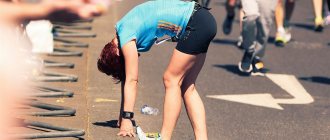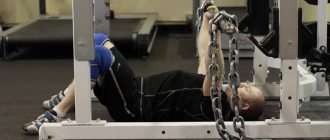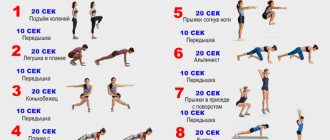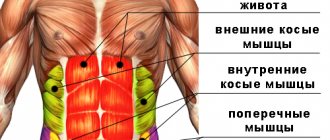Overwork
You may have chosen the wrong physical activity for yourself. Let's say, after a long break from fitness, we immediately went to a tai-bo or advanced cycling lesson. Or they went for a long run, not fully recovering from the illness. In this case, you may feel dizzy during or after the training. You may also experience shortness of breath, nausea, and weakness.
Be careful! According to a 2015 study, most injuries in fitness clubs (36.2% of all cases) occur due to overwork. Don't forget that it can > not only in the gym, but also during a home workout and even during physical education at the institute.
Causes
If a regular workout causes discomfort in the head and a feeling that precedes vomiting, there may be many reasons. The most likely are:
- Overheating and oxygen deficiency . The body benefits from exercise when there is sufficient fresh air. Lack of ventilation and increased sweating in synthetic clothing, which causes the body to overheat, can trigger an attack of dizziness.
- Unbalanced diet . If a person’s daily diet is not enriched with useful elements, then during physical activity he may feel dizzy and nauseated. During sports activities, internal energy resources are consumed more actively, which causes discomfort. At the same time, you should not overeat before going to the gym, since the body devotes all its energy to enriching muscle tissue with oxygen.
- Dehydration . During physical activity, a person sweats and loses a lot of fluid. If you do not restore your water balance during training, you may feel dizzy.
- Adrenaline rush . Sports activities promote the synthesis of stress hormones, which provoke vasospasm.
- The use of certain medications . Antibacterial agents, tranquilizers, and antihypertensive drugs can negatively affect a person’s well-being during physical activity.
Lack of oxygen
Are you sure that this is the lot exclusively of those who do fitness in stuffy rooms? No matter how it is! A lot depends on how you breathe during exercise. If it is not deep, the body will not receive the required amount of oxygen to sufficiently provide both intensively working muscles and the brain. The brain will suffer from a lack of oxygen, and you, accordingly, will suffer from dizziness.
The reasons for this can be different: from completely harmless (overwork, vegetative-vascular dystonia) to serious (serious disturbances in the functioning of the heart). The fact that your blood pressure has dropped should also include >: weakness, lack of concentration, fog before the eyes, lightheadedness.
First aid
If you start to feel dizzy during training, you should not continue exercising, because the risk of losing your balance is extremely high. You need to find support or sit down to rest and catch your breath. Under no circumstances should you make sudden movements, so as not to provoke a second attack.
It is advisable to take a horizontal position without raising your legs above the level of your head and shoulders. Rinsing your neck and face, getting some fresh air, and taking a sip of water helps you get back to normal. There is no need to be ashamed of your condition. If your health does not improve, you need to seek help from a person nearby.
Dizziness after fitness: how to prevent
- Adequately assess your level of fitness (fitness tests will help with this) and choose physical activity accordingly. Increase the intensity of your training gradually.
- Eat before your workout and eat afterward. What and when exactly, we described in detail here.
- Maintain drinking regime. Especially carefully - on days of intense physical activity and activities in the heat.
- Learn proper breathing during training. Yoga lessons will help you learn to monitor it, breathe smoothly and have blue eyes.
Adequate nutrition before strength training
Those who often go to the gym know that eating before training is quite inconvenient. It is more difficult to warm up on a full stomach, exercises are more difficult, and as a result, many gym goers try not to eat 4-5 hours before visiting the fitness club. Sometimes an athlete cannot have a snack for reasons beyond his control. For example, if you have to go to the gym immediately after work.
As a result, after a heavy load, a healthy person may feel dizzy and nauseated. The point is the lack of energy provided by food. Thus, the answer to the question of why you feel sick after training or have a headache will be “insufficient nutrition.”
The solution to this problem is to consume liquid foods, such as protein shakes. Protein is a complete, quickly digestible protein. If you do not want to eat your usual porridge with meat or other solid foods, then replace your meal with the described cocktail an hour before the start of classes. You can add whipped banana to milk and protein. This way you will feed your muscles and ensure you feel good after exercise.
When to see a doctor
Be sure to visit a specialist if:
- You have carefully studied all the possible causes of dizziness during and after training, but you still haven’t found > and don’t understand what’s happening to you.
- You believe that the cause of dizziness is your chronic illness.
- The situation repeats itself, although you take all precautions.
- You lose consciousness and/or other, alarming symptoms, such as chest pain, are added to the symptoms described above.
- You are pregnant, at any stage. Even if > after seemingly harmless gymnastics for expectant mothers.
Diseases that cause dizziness
There are also more dangerous reasons why you feel dizzy and have a headache after and during training. They are associated with diseases occurring inside the body:
- Hypertension . Active loads contribute to increased blood pressure. If a person is healthy, then his body will begin to adapt, but if the illness is present, then it will worsen, manifesting itself in unpleasant symptoms. Experts advise hypertensive patients to engage in calm physical exercise: swimming, morning exercises, walking.
- Hypotension . To ensure that enough oxygen reaches the muscle tissue during exercise, blood circulation increases. The vessels dilate, and at the end of classes all processes are normalized. Hypotonic patients feel an increase in blood pressure, but when the blood vessels narrow again, an attack of dizziness begins.
- Hypoglycemia and hunger strikes . If there is insufficient glucose in the bloodstream during vigorous physical activity, a person may experience various ailments.
- Osteochondrosis . Deformation of the cervical vertebrae often causes spasm of the blood vessels and muscles of the neck.
- Atherosclerotic changes in blood vessels . While doing physical exercise, the patient may complain of pain in the frontal part of the head. With this pathology, it is better to perform exercises without jumping and jerking, when the body is in a fixed state.
- High intracranial pressure . You should only do light exercise and avoid heavy lifting.
If you have diseases that affect blood vessels and veins, diabetes, changes in blood counts, or heart problems, it is better to consult a doctor before going to the gym. It wouldn’t hurt to communicate with a coach and jointly develop a sports program taking into account a person’s individual characteristics.
Why do you feel dizzy during/before/after training and what to do?
Dizziness can strike at any time, which causes trouble and various problems. To get rid of the disease, you should immediately identify the main causes and, if necessary, begin effective treatment. When spatial orientation is lost during physical activity, the perception of surrounding objects becomes difficult.
Working out in the gym or at home is an excellent choice for maintaining tone, good physical shape, increasing endurance, etc. But it is very important to choose the right set of exercises so as not to harm the body or overwork it.
During training, a person may suddenly experience discomfort in the form of headaches, dizziness, sometimes he feels nauseous, vomiting, and his general condition worsens. This phenomenon is typical for experienced athletes when they begin to train intensively, using a large number of muscles. But for newcomers to the sport, such manifestations cause serious concern and panic.
5 main reasons
- Lack of oxygen in the room and overheating.
To obtain the desired results from training and benefits for the body, oxygen is required. With insufficient intake, a person begins to experience dizziness.
Intense exercise causes increased sweating, but the thick fabric of workout clothes often disrupts the natural cooling mechanism.
This leads to the development of heat stroke, which is characterized by dizziness, nausea, vomiting, fever, and loss of consciousness.
With food, the human body receives a huge amount of useful substances and vitamins, so if you have a poor diet during sports, you feel dizzy, feel nauseous and vomit.
This is due to the depletion of internal energy reserves during physical exercise. But feeling unwell can also occur if you overeat immediately before training. The body spends its “force” not on supplying the muscles with oxygen, but on digesting food.
A person involved in sports or heavy physical activity loses a huge amount of moisture through sweating. As a result, nausea, clouding in the head appears, and the natural process of emptying the stomach slows down.
- A sharp surge of adrenaline.
Positive and negative results of exercise have an impact on a person’s mood. Excessive expression of emotions leads to an increase in the amount of adrenaline in the blood, which causes vasospasm. This is what causes dizziness and pain.
Some groups of medications also negatively affect the condition of a person who decides to play sports. These include strong antibiotics, drugs to normalize blood pressure, and tranquilizers.
Why else can your head get dizzy during class? The causes may be pathologies in the body, the intensity of which increases with physical activity.
These include:
- low or high blood pressure;
- low blood sugar;
- hyponatremia or insufficient sodium concentration in the blood.
First aid if you feel bad during training
If you feel nauseous or dizzy during or after training, under no circumstances should you continue the exercise, as the person will lose balance. You need to find a place and immediately sit down and recover.
If possible, take a horizontal position, you need to make sure that your shoulders and head are at the same level, which will enrich the brain with blood. Any sudden movements are contraindicated; it is recommended to close your eyes and calm down.
One-time dizziness is not a cause for concern, but if it happens again, it is advisable to contact a neurologist to identify the cause and begin treatment quickly.
5 tips to avoid headaches when playing sports
- There should be at least 1.5-2 hours between meals and training.
- Preferably choose liquid and carbohydrate foods.
- You should not drink a lot of water before exercise (exclude carbonated drinks).
- During intense exercise, drink water in small sips (no more than 0.5 l), drink another 0.5 l within an hour after.
- When the first signs of dizziness and nausea occur, you should rest in the fresh air for a while.
Having a sporty attitude and working on yourself is good for the body. But any loads should be selected in accordance with physical capabilities, existing chronic diseases, and individual characteristics.
The intensity of the load should increase gradually, which will allow the body to adapt to the changes that occur.
Did you find the answer in the article? Share with your friends:
Source: https://golovushka.ru/golovokruzhenie/kruzhitsya-golova-vo-vremya-trenirovki.html
Prevention
If you do not want to take medications for headaches during physical activity, then you need to follow simple recommendations for its prevention:
- In order for the body to get used to strength training and not react with pain, the load should be increased gradually;
- When playing sports, watch your posture and the level of tension in your neck muscles;
- do not allow the body to dehydrate during physical activity; to do this, drink a glass of still water 1 hour before training;
- do not eat dairy yoghurts, nuts, citrus fruits, bananas before hard work;
- to avoid headaches during intense workouts, you do not need to hold your breath - you should breathe evenly while doing the exercises;
- Before any sport, a warm-up will help the body adjust to the load, for which moderate movements are suitable: running in place, swinging your arms, tilting your head.
How to determine: is it a behavioral reaction of the body or physiology?
A short-term imbalance in conditions of changing load on the body indicates a physiological reaction. Under normal conditions, oxygen is transported through the bloodstream from the lungs, and carbon dioxide comes back from the tissues.
Under conditions of prolonged excess oxygen, it binds to hemoglobin. There is no longer enough free hemoglobin to remove carbon dioxide, which leads to tissue poisoning with carbon dioxide.
But in conditions of insufficient oxygen supply to organs, hypoxia occurs. For an untrained person, these factors can lead to dizziness, nausea and even loss of consciousness.
With consistent training, many physiological negative effects will decrease over time.
A short-term imbalance in the absence of dynamics (static state of the body) during physical activity indicates a behavioral reaction of the body. This indirectly indicates the imperfection of the vestibular apparatus. Exercise and running help train the vestibular system, minimizing the negative effects.
In most cases, there is no need to see a doctor. The physiological and behavioral reaction of the body that causes dizziness is short-term in nature.
Dizziness during workouts
Feeling your body, feeling slim and strong is the goal of any person who decides to attend a workout in the gym, jog in the park, or do intensive abdominal pumping and push-ups at home.
But suddenly, after performing the next series of exercises, a feeling of loss of support appears, all surrounding objects float away somewhere. This phenomenon is dizziness, which can cause headaches, nausea, and even vomiting. Most bodybuilders say that each of them has more than once felt dizzy and nauseous, in particular when training a large muscle group at the same time. However, for an ordinary person who is new to sports, dizziness is a frightening factor, and a very unpleasant sensation. Why is this happening?
Dizzy due to excessive stress on the body, which he did not receive during the usual, measured rhythm of life. Often, just such a stressful situation happens after or during a workout in a fitness room, where a person came to get a boost of energy and vigor, but overloaded the body.
Test: Why do I often have headaches? What is the reason?
Results
Determining why you feel dizzy after exercise is not easy. First of all, you need to identify the accompanying symptoms. If this is overtraining, it is enough to stop the symptoms; if these are problems related to blood pressure, you should consult a doctor. But in most situations we are talking about a banal overload of the body.
Author Lyudmila Zhavoronkova
Medical expert of the project. 30 years of experience in practical medicine. from 2006 to 2020 - head of the service for examining the quality of medical care and protecting the rights and protection of the rights of the insured at SoGAZ-med. since 2020, scientific consultant and medical expert of the Cross.Expert project.
Editorial team Cross.Expert
Why do headaches occur after attending aerobic exercise?
We figured out the reasons that can cause headaches and nausea during strength training. But what if you go to the gym for a treadmill workout? How then can you explain the discomfort after class?
First of all, check whether you are taking any medications. Some pills can cause migraines by dilating or constricting blood vessels due to the extra strain. If you do not take any medications, there may be another cause of the headache. Because the heart works at an accelerated rate, it pumps a much larger volume of blood than at rest. Because of this, the blood vessels dilate. But now you have finished the workout, your heart begins to beat at its normal rhythm, and the blood vessels cannot decrease in size as quickly. This may make you feel dizzy or nauseous.
A sharp increase in loads.
If you miscalculate your strength and take too much weight, you may well feel dizzy.
There have been cases when people lost consciousness from severe overexertion.
Therefore, you should not chase quick results.
Start doing sets with lighter weights, gradually increasing the load until it is acceptable.
Why do you feel dizzy after training: reasons, help, doctor’s recommendations
The frantic pace of life and lack of free time are the reasons why people rarely play sports. Against the background of low activity, a number of ailments can occur.
Feeling unwell after training is a reason to pay attention to your health. Dizziness after exercise is a symptom of a more complex problem.
Causes of dizziness after exercise
- Lack of oxygen . If a person runs at a fast pace for a long time or performs intense strength training, then dizziness may occur due to lack of air. Any load should be performed at a moderate pace.
- Great physical activity .
Often people begin to overdo it with sports, increase the load, and begin to train longer and longer. As a result, pressure drops and the body is no longer able to maintain the given intensity. - Dehydration.
Dizziness can be caused by a sudden change in blood flow and a change in heart rate, so during training you need to select the optimal load that the body can perform. Dehydration occurs due to increased body temperature and profuse sweating. During training, you should always drink water, but under no circumstances not half a bottle at a time.You need to drink in small sips, alternating water intake with approaches to physical exercise.
- Nutrition .
When energy is depleted, dizziness occurs. Our body is like a car. It must be refueled with fuel, and for humans with food. To provide the body with sufficient energy, you need to eat shortly before training. He recommends having a snack two hours before training. Food should contain proteins and complex carbohydrates, such as chicken and buckwheat, rice and fish. A nutritious meal will help you get a good workout and replenish your strength. If you can’t eat a big meal, you need to have a light snack (fruits, nuts, dairy products). - Medications .
Possible reasons include the use of drugs to treat blood pressure, the use of antibiotics or tranquilizers. In this case, it is better to wait until the medication is finished and give preference to walking at a calm pace.
Presence of diseases
What mechanisms occur in the body that contribute to dizziness?
- Hypertension . With this disease you need to do certain exercises. Strength training with axial loading is contraindicated. For safety, it is better to practice under the supervision of a trainer.
- Disorders of the vestibular apparatus . Avoid exercises that can cause motion sickness. Choose a load without sudden movements, perform physical exercises slowly and consciously.
- Increased intracranial pressure . After the training, you may experience headache, dizziness, and a sense of schedule in the parietal region. During exercise, monitor your heart rate; the load should be gentle with minimal weight.
- Atherosclerosis . In addition to dizziness, a person with this disease may experience severe pain in the frontal area. It is better to give preference to physical activities in which the body is fixed, without jumping or sudden changes in position.
- Osteochondrosis . If a person suffers from osteochondrosis of the cervical spine, then dizziness may occur due to spasms of the neck muscles. When doing strength exercises, people with this problem should not hold their breath or lift weights, which lead to excessive straining.
- Vegetovascular dystonia . The autonomic nervous system regulates the activity of internal organs. If the level of physical activity does not match, hand tremors and dizziness appear. It is necessary to exclude exercises in which you need to suddenly change body position. The load should be moderate. Exercises in which the head is lower than the chest and exercises upside down are contraindicated. If you start to feel dizzy, it is better to stop and wait until all the symptoms pass.
Read more about what symptoms of dizziness are here.
How to provide help if an attack occurs in the gym during training?
Dizziness may occur during exercise. A person feels that he is losing his balance and his vision begins to swim. This often happens among office workers, whose bodies get used to a sedentary lifestyle and any workout becomes a kind of stress.
What to do first?
If you suddenly feel dizzy, you should not panic or fuss. Find a place where you can sit, close your eyes, breathe slowly and try to calm down. It’s very good if you have the opportunity to lie down.
The head and shoulders should be at the same level. At the same time, the blood supply to the brain is normalized.
In no case should you make sudden movements , as this can lead to a new attack and loss of balance.
It is better to sit closer to the place where the air comes in, drink water, rinse your face and ears. If you do not have the strength to complete all the procedures yourself, you need to contact any person or the trainer on duty. There is no need to be ashamed of your problem; there is nothing more important than health.
What symptoms should you see a doctor for?
Dizziness when turning or bending the neck is most likely associated with osteochondrosis ; when changing body position, destruction of certain receptors of the vestibular apparatus is possible.
If attacks occur frequently during sports, then you need to consult a neurologist (read more about frequent attacks of dizziness here).
The specialist needs to tell you as accurately as possible the situation when you started feeling dizzy.
Is exercise allowed for dizziness?
When the first symptoms of dizziness occur, you must stop training, sit down or lie down. Once symptoms subside, reduce exercise weight and intensity. Over time, the body must adapt and bear the load more easily.
If dizziness occurs constantly, then you need to consult a doctor.
You need to play sports, over time the body will be trained and doing the exercises will become easier. Physical education will help improve blood circulation and strengthen the walls of blood vessels . You don't need to go to the gym every day. The optimal time is two to three times a week for an hour and a half.
Improvements will not come immediately; you need to get ready for long-term work. Under no circumstances should you train through force and pain. When choosing exercises, soberly assess your strength and health status.
It is better to give preference to slow load or moderate cardio training , and exclude workouts that do not require a break. For example, on a treadmill, choose the lowest incline angle and walk at a calm pace. You need to lift dumbbells at a moderate pace. Start with light weights.











